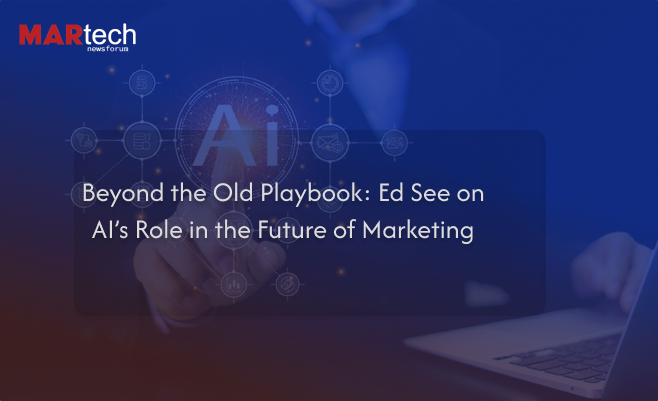
In a marketing landscape increasingly shaped by artificial intelligence, Ed See, Partner at McKinsey & Company and a leader in the firm’s Marketing & Sales Practice, is championing a bold departure from the “old playbook” that once guided the world’s most successful brands.
In a forward-looking interview focused on the evolution of marketing strategy, See explored how AI is not just a tool — it’s the new foundation for how brands must think, act, and grow. The shift, he explained, is not incremental but foundational, requiring organizations to rewire their operations, mindsets, and customer engagement models.
“Marketing can no longer rely on static campaign cycles and intuition alone,” said See. “The future belongs to organizations that embrace AI as a central nervous system for understanding consumers and orchestrating personalized, real-time experiences at scale.”
Outgrowing the Traditional Marketing Model
For decades, marketing revolved around linear campaigns, calendar-driven activations, and post-campaign analysis. That approach, according to See, is ill-suited to a world where consumers expect instant, relevant, and seamless interactions across digital and physical touchpoints.
Today’s marketers operate in an environment of constant data flow and high consumer expectations. AI unlocks the ability to process that data, predict behaviors, and respond in milliseconds—not weeks.
“We’re seeing a generational shift,” See explained. “AI doesn’t just improve marketing—it demands a total reinvention of it.”
AI as a Growth Engine, Not Just a Tool
Artificial intelligence has evolved far beyond chatbots and automation. For marketing leaders, See suggests that AI must be viewed as a strategic growth engine—powering everything from segmentation and dynamic pricing to content generation, media buying, and customer journey orchestration.
He pointed to examples where global brands are using AI to create hyper-personalized customer experiences, reduce churn, and optimize spending across the funnel.
“AI’s value lies in its ability to continuously learn, adapt, and drive decision-making at scale,” said See. “It’s not just doing things faster—it’s doing entirely new things we couldn’t have imagined five years ago.”
Breaking Down Silos for Agile Marketing
One of the biggest barriers to AI adoption is not technology—but legacy organizational structures.
According to See, many companies still operate in silos that prevent data from flowing freely between marketing, sales, product, and customer service teams. AI thrives on cross-functional integration, and he emphasized the need for agile operating models that support collaboration, iteration, and speed.
“Agility isn’t just a buzzword,” See noted. “It’s the operating principle for successful AI adoption. Teams must be empowered to experiment, fail fast, and scale what works.”
He also emphasized the need for marketers to upskill—not just in technology, but in data literacy, experimentation, and customer-centric thinking.
Responsible AI: The Ethics of Personalization
As brands gather more data and personalize at deeper levels, the ethical implications of AI in marketing are growing.
See stressed the importance of building trust with consumers by deploying AI responsibly. This includes transparent data practices, algorithmic fairness, and a clear value exchange for the consumer.
“Consumers are increasingly aware of how their data is used,” said See. “Marketers must ensure that personalization doesn’t become manipulation. Responsible AI isn’t optional—it’s a mandate.”
Real-Time, Always-On Marketing is the New Normal
Perhaps the most transformative idea See shared is that the marketing of the future is not just digital—it’s continuous.
Traditional campaign timelines are giving way to real-time, always-on systems that sense, learn, and act instantly. AI allows marketers to respond dynamically to customer signals, external trends, and competitive shifts in real-time.
“We’re entering an era where marketing is no longer planned monthly or quarterly,” he said. “It’s orchestrated moment by moment, driven by insights and powered by machine learning.”
This always-on capability not only enhances customer experience but also drives efficiency, enabling brands to allocate resources more effectively and maximize return on investment.
Rewriting the Rulebook
The overarching message from Ed See is clear: AI isn’t a plug-in for the old way of doing marketing—it’s a call to reinvent it entirely.
To succeed, marketing leaders must let go of outdated strategies, invest in scalable AI infrastructure, empower cross-functional teams, and lead with curiosity and responsibility.
“This is not about future-proofing—it’s about building for a new present,” See concluded. “Those who cling to the old playbook will be left behind. Those who embrace AI will shape the future of marketing.”
About Ed See
Ed See is a Partner at McKinsey & Company, where he co-leads the firm’s Marketing & Sales Practice. With over two decades of experience in helping brands drive growth through data, analytics, and digital transformation, See is recognized as a global thought leader on the intersection of marketing and AI.